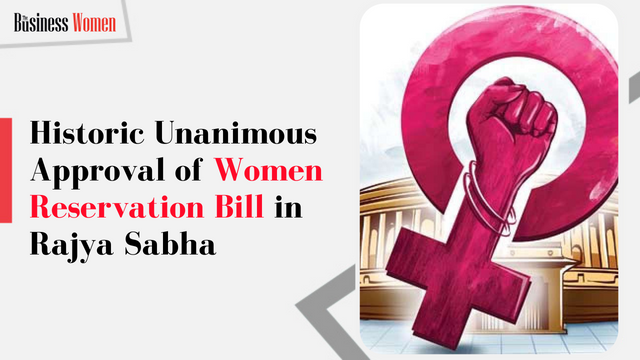Historic Unanimous Approval of Women Reservation Bill in Rajya Sabha
September 21, 2023 – New Delhi
On the historic date of September 21, 2023, New Delhi bore witness to a momentous event as the Rajya Sabha unanimously approved the 128th Constitution Amendment Bill of 2023. This landmark legislation, formally titled ‘The Constitution (One Hundred and Twenty-Eighth Amendment) Bill, 2023,’ signifies a profound shift in India’s political landscape. It introduces the provision of reserving 33% or one-third of seats in both the Lok Sabha and state Assemblies for women.
The preceding day, this pivotal amendment had secured a resounding two-thirds majority in the Lok Sabha, cementing its path to becoming law. With the Rajya Sabha’s unanimous endorsement, this transformative bill now bears the seal of approval from both houses of Parliament. This monumental achievement heralds a significant stride toward achieving gender parity within India’s legislative bodies, etching a crucial chapter in the nation’s history.
Notably, the Women’s Reservation Bill holds the distinction of being the inaugural legislation passed within the new Parliament building. It received unanimous support in the Upper House, with a remarkable 214 votes in favour and none opposed, under the watchful guidance of Chairman Jagdeep Dhankhar. This accomplishment marked the culmination of a special session, underscoring the paramount importance of gender equality in the realm of Indian politics.
Prime Minister Narendra Modi’s Praise
Prime Minister Narendra Modi, acknowledging the passage of the women’s quota bill, hailed it as a “defining moment in our nation’s democratic journey.” Expressing his gratitude to all the Rajya Sabha members who lent their support to the Nari Shakti Vandan Adhiniyam, PM Modi conveyed his congratulations to the 140 crore Indians and thanked the Rajya Sabha MPs for their unanimous endorsement. He emphasised the legislation’s role in bolstering women’s representation and empowerment in India, paying tribute to the unwavering resilience and invaluable contributions of countless women to the nation.
PM Modi underscored the historic significance of this step, affirming the government’s unwavering commitment to ensuring the effective representation of women’s voices in the nation’s decision-making processes.
The Women’s Reservation Bill Explained
The ‘Nari Shakti Vandan Adhiniyam,’ or Women’s Reservation Bill, strives to reserve 33% of seats for women in the Lok Sabha, state legislative assemblies, and the Delhi assembly. It’s essential to note that this quota doesn’t extend to the Rajya Sabha or state Legislative Councils. The implementation of seat reservations will be contingent upon delimitation following the release of pertinent data from the first census.
In the Lok Sabha, the bill garnered overwhelming support, with 454 members in favour and only two opposing it. The Rajya Sabha, however, witnessed a historic moment as it unanimously passed the bill during a special session, finally putting to rest a bill that had been pending for over 25 years.
Amit Shah Commends Historic Milestone
Union Home Minister Amit Shah commended the bill’s passage, citing it as a testament to the adage, “Where there is a will, there is a way.” He celebrated it as a historic milestone on the path to equitable governance and highlighted that by fulfilling this longstanding demand, Prime Minister Modi has sent a powerful message of gender equality and inclusive governance on a global scale. He expressed heartfelt gratitude to Prime Minister Modi and extended congratulations to every citizen for this significant achievement.
Nirmala Sitharaman Highlights Empowerment Initiatives
Minister Nirmala Sitharaman stressed the critical importance of forging consensus for the economic and social empowerment of women. Responding to opposition criticism about the timing of the bill’s introduction after nine years, she elucidated that the government had been actively implementing various schemes for the socio-economic empowerment of women since 2014.
Sitharaman pointed to key initiatives, including the distribution of over 9 crore gas connections under Ujjwala, the construction of 11.72 crore toilets, the Beti Padhao, Beti Bachao Yojana aimed at achieving gender balance, the extension of paid maternity leave from 12 to 26 weeks, and providing 9.82 crore paid tap connections. She emphasised that the government had introduced reservations for women constables in the Central Armed Police Forces and had opened doors for women in institutions like the National Defence Academy and Sainik Schools, collectively illustrating the government’s unwavering commitment to advancing the status and opportunities of women in India.
Sitharaman Connects Women’s Empowerment to Key Policy Changes
Nirmala Sitharaman drew connections between women’s empowerment and significant policy changes, such as the revocation of Article 370 and the criminalisation of instant triple talaq. She underscored that Article 370 had previously hindered women married outside the state of Jammu and Kashmir from inheriting property, and the persistence of instant triple talaq, though absent in many Muslim-majority countries, had been allowed in India for an extended period. She emphasised that the government’s focus was on justice for women rather than appeasement.
Regarding reservations in the Rajya Sabha, Sitharaman explained that it wasn’t feasible due to its members not being directly elected.
In response to criticism from Congress member K C Venugopal about senior BJP leaders voting against the Constitutional Amendment of 1989 for women’s quota in local bodies, Sitharaman noted that opposition to the amendment was not confined to one party. She highlighted that several regional leaders, including M Karunanidhi, Jyoti Basu, and N T Rama Rao, had also opposed it, as they believed it could encroach upon states’ powers.

